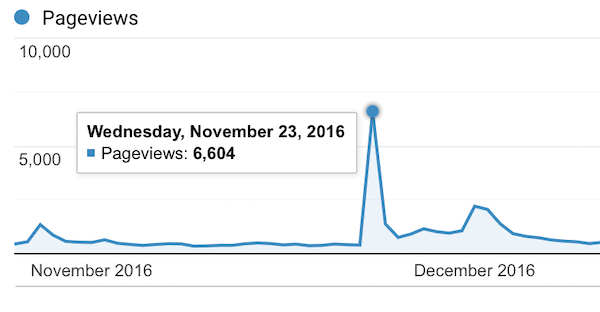SEO tips: Seven reasons why you’re losing search traffic on Google
Checked your website analytics and disappointed to see that your numbers are going down? Find out seven reasons why you’re losing search traffic on Google.
If you are a small business working on your SEO by yourself, you’ll probably find it frustrating and confusing at times. But nothing makes your heart sink more than checking your website analytics and discovering that you are actually losing traffic.
Maybe you worry that you’ve done something wrong, or even that your traffic will keep dropping until there’s no one visiting your website… and your business suffers as a result.
These are very real and important worries. Because if you have a business website today, then you need to be using SEO to attract customers to it. through organic search.
So how can you find out why you are losing organic search traffic, and what can you do about it? Let’s look at seven possible reasons.
1) Interest in your topic is declining
The first reason is partly out of your control. And that is just that there’s less interest in your website topic, or business sector.
You see, search volume for keywords aren’t static. It can increase or decline as public interest in that topic increases and declines. You can even get seasons peaks – for example, here’s what the search traffic for Valentine’s Day looks like over the years on Google Trends:

So if your website is selling something that is in fashion or in demand now, such as skinny jeans, you can expect to benefit from an increase in traffic from Google. But if that trend declines, it makes sense that your web traffic would naturally decrease.
One was to check the popularity of a search term is to check it on Google Trends. Here’s what the search traffic for ‘skinny jeans’ looks like. as you can see it is a trend that built up, but is now in decline:

So what can you do if you think your loss in traffic may just be due to less people searching for what you do or talk about? Your first option is to pivot. So, for example, if you previously sold skinny jeans and wide-legged jeans have become the must-have style you can sell them instead.
Or if your website featured a hobby or topic that has gone out of fashion, can you identify what the people who used to visit your site are now interested in, and start serving content based on that? Or seek a different audience?
An example here would be if your website featured information about analogue TVs. Here’s the Google Trends search traffic over time for ‘analogue TV’:

As you can see, this search term has been in decline for a few years. If your site was formerly about reviewing and buying new analogue TVs, you could either decide to appeal to the vintage market and feature classic analogue TVs, or you can switch to digital TVs and follow customers who are looking for information on these.
It may not always be possible to pivot your site, or change audience, but if you suspect your dip in traffic could be because of a change of search traffic, and that change isn’t going to correct itself, it’s worth a try.
2) Interest in your keywords is declining
The second reason why your search traffic may be dropping is that the keywords you have focused on are falling out of favour. This can happen sometimes as language or fashions evolve and the terms we use change.
Here’s a good example of this. A few years ago, I wrote an article sharing the 10 giveaway signs of a toxic person. At that time there wasn’t a lot of content on this topic, so it got a lot of traffic. Then other websites started to link to it, including some big news sites. This pushed it right to the top of Google.
One day a national BBC radio show did a segment on toxic people, and as we were on the top spot of Google, we got even MORE traffic from the article. In this case we had over 6,600 people read the article on one day:

But then, over time, as the subject of toxic people starting getting more media coverage and our collective knowledge on the subject grew, other terms became more fashionable. As a result I noticed that our toxic article was getting less traffic, but articles about narcissists were picking up more.
Here’s the Google Trends data on the search demand for the keyword ‘narcissist’ over time:

So I consciously started writing for this term, instead of ‘toxic’. And here’s how just one of our articles on narcissists (in this case, how to argue with a narcissist) has picked up more traffic. You can also see spikes where the term is searched for more frequently, as our position on Google has remained the same:

You may find something similar happening on your website. Perhaps a blog or webpage that previously ranked well starts getting less traffic. If so, check whether perhaps the keywords it was ranking for have either fallen out of use, or become more competitive.
And if this looks likely, identify what keywords people are using now, or what terms other websites haven’t yet picked up on, and either edit your old content to reflect them, or create new content aiming for the new keywords, like we did.
3) Someone has better SEO
The third reason why your search traffic for particular pages or blogs may start to decline could be that you’ve been out-SEOd. Basically this means that someone – possibly a competitor – has created pages and blogs for the same keyword, and is better at SEO.
This could mean that they have created better content, in which case the challenge is thrown back to you again to improve yours or create new content. Or their website could have a higher domain rating, and Google pushed them above you as a result.
All you can do in this case is continue to work on your own SEO and either update your content or create new content for similar but different search terms to see if you can find an opportunity there.
This has happened to us on occasion. Sometimes we have – by luck as much as anything else – covered a topic before other sites. And as a result we have ranked at the top of Google for it. Then, as that topic became more fashionable, bigger sites started covering it (usually in our case this has been national newspapers who we can’t possibly compete with) and knocked us off the top spot.
Like we advise you, when this happens we simply continue to work on our own SEO and create new content with slightly different keywords. As noted by Michael McDougald – this is where the expertise of SEO experts becomes invaluable, as they can help you refine your strategy and identify new opportunities to regain traffic. By analyzing the latest trends and understanding what your competitors are doing, they can guide you in creating targeted content that outperforms others.
Also, it is rare that you lose ALL your traffic. While you might lose a position or two on your biggest keywords, or even fall off page one of SERP (the search engine result page), most well-written SEO articles will rank for more than one search terms. So while you might not get the same volume of traffic as before, it won’t disappear completely.
4) You’ve been relying on a small handful of pages for your SEO
One common reasons that websites notice a gradual decline in their search traffic is that they were relying on one or a small number of pages or blogs to do all their SEO heavy lifting for them.
This can sometimes happen when they get lucky with a page or blog or two, and rank high enough on Google for their search terms that they don’t need to make SEO a priority.
But this is a mistake, because nothing stays static when it comes to SEO. Every page or blog goes through five phases when published:
- Spike phase: A new blog or page will often see an initial spike as existing visitors find it, or you share on email or social media.
- Trough phase: After that initial spike, traffic will usually die down.
- Growth phase: Over time, your page mat start to pick up traffic from SEO as it climbs the SERPs.
- Plateau phase: Eventually it will find its place on Google and deliver you regularly, fairly consistent traffic.
- Decay phase: Over time, you’ll notice traffic start to decline as your page ages and Google pushes other content ahead of it.
If you are relying on a small number of pages or blogs for your SEO – or worse, just one – you’ll notice the drop in traffic when they enter the decay phase.
So what can you do? As a general piece of advice, we recommend continuing to work on your SEO and produce regular content. If you are doing well with a particular search term, you can create more content for it, and even aim to start building a topic cluster. This way, even if one blog or page starts decaying, you’ll have others to share the SEO burden.
You also have another option: you can attempt to breathe some new life into your decaying page or blog. Here are some suggestions:
- You can expand it by adding new content to make it longer or more comprehensive.
- You can update it by ensuring any data or advice is current and still relevant.
- You can check that you haven’t missed any SEO opportunities on that page or blog.
- You can re-share it to show it a bit of love and maybe pick up some new backlinks for it.
Our recommendation is not to wait for your key pages or blogs to start filing down the rankings. Instead, it’s wise to work on your SEO every month, and set reminders to routinely check pages and blogs that rank well to ensure they are refreshed regularly.
5) You’ve been hit by an update
This reason is less easy or quick to fix, but not impossible. If you know anything about SEO you’ll know that Google periodically updates its algorithm – the system it uses to decide which web pages to rank for which search terms, and how far up its SERP to place them.
In the early days, Google made big changes fairly infrequently – you may have heard of the Penguin update, for example. But now it makes thousands of small changes every year. Though it still sometimes does big updates, such as the core update in September 2022.
So how do these affect you? When Google updates its algorithm, it could be that your website as a whole, or just individual pages, no longer rank highly in Google’s ‘list’ of requirements.
An example of this would be if your website was not mobile optimised when Google rolled out its mobile-friendly update in 2015. After this update you might have noticed a big drop in your search traffic.
These days with more frequent but smaller updates, you are unlikely to see your traffic fall off a cliff overnight, but it can still happen – as some websites experienced this September.
So what can you do? Obviously you can’t control Google’s algorithm updates! But you can ensure you stay up to date on the latest SEO best practice and understand what Google is currently looking for… while avoiding falling for any black hat short tricks.
It is also essential that you make sure you are getting your SEO right, and doing it ALL the time. If you want to hit the top spot of Google and stay there, you need to earn that place. And if you’d like an easy, doable plan to help you, I recommend getting our SEO Kit.
6) Your SEO strategy isn’t up to date
If you’re like many small businesses, you may have worked on your SEO when you created your website. Perhaps you even invested in an agency to help you. Then you sat back and watched your traffic start to come in.
But times change, and over the years you’ve noticed that your traffic is starting to decline. And the reason for that can simply be that your SEO strategy that was cutting edge three, five or even 10 years ago is no longer relevant.
What Google is looking for today is different, and the strategy you are pursuing just won’t work any more. If this is the case then you need to refresh your SEO knowledge and apply to your website.
And the good news is that, if you had good SEO in the beginning, you’re ahead of someone starting from scratch, and it might just require a few tweaks to your website and some new pages and blogs to win Google over again.
7) You’re not regularly looking after your SEO
The final reason why you may be losing search traffic on Google is that you have assumed, as it is easy to, that SEO is a once-and-done activity. You build your site, write a few blogs and then forget about SEO.
But it doesn’t work like that. SEO is an activity that you need to be doing every month if you want to earn your place at the top of Google’s SERPs for your chosen search terms.
It might help to think of that top spot as not being something you can buy once and keep forever, but a space you rent on a monthly basis. And that ‘rent’ payment is made in the form of regularly keeping up your SEO activities.
So what are those activities? Here are some suggestions:
- Producing regular content
- Feeding your topic cluster
- Adding to your search terms
- Gaining new backlinks
- Keeping abreast of any changes to your keywords
- Watching for any changes to SEO trends
Get 57 free tips to boost your SEO
Love more help to get your content found by Google and ranking on their search engine results pages? We’ve put together 57 easy SEO tips for you in our free cheat sheet.
Follow each of these tips and, over time, you’ll notice a big difference in your SEO. You can get your copy here now.










